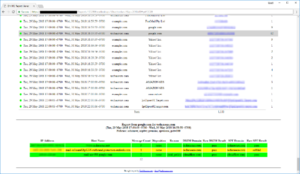


On the other hand I have no problem using the TonidoPlug to serve up local media files and the TonidoPlug's ability to stream media to UPnP and DLNA compliant devices like the Xbox 360 and PlayStation 3 are enticing. That's where the Money and Workspace-like apps make no sense to me. The main draw of the TonidoPlug is the Tonido service that lets users access these applications and their files remotely, outside of their network but in the end that introduces another failure point - the home Internet connection. Even if these included TonidoPlug applications were up to par with other competing cloud services, I would not trust my daily workflow on a cheap piece of hardware that could stop working at anytime and that relies on a home Internet connection that is just as unreliable. The Tonido apps are all minimum viable products at best and do not compare to other feature-rich web or desktop applications. Unfortunately, I have come to the conclusion that all of the included applications would never replace my current usage of other services or applications for their respective utilities. Find the local IP of your TonidoPlug on the network by going to /ip then access that in your browser the URL is usually something like IP]:10001. Hardware setup doesn't really warrant a mention - just plug it in, attach an Ethernet connection and USB storage device, be it a USB stick or external hard drive. That being said it appears they are still in the early stages of fostering this developer community and the only applications out are ones written by CodeLathe.īefore delving into those TonidoPlug web applications I'll talk about setup. Tonido has a well-documented developer platform and SDK out for this purpose. The larger goal is to get developers to build other applications for inclusion in Tonido's own app store. CodeLathe, the folks behind Tonido, have developed a web interface and suite of applications. This is where Tonido shows off what it can do. The underlying operating system on the TonidoPlug is Ubuntu 9.04, but seeing as how users have access to SSH and apt-get (though it is broken right out of the box) this can be user-updated whenever necessary. As a network device and server more than a desktop, the plug computer is meant to be accessed through a web interface (or SSH if you prefer. Like its ilk, the TonidoPlug does not include any sort of monitor or display connector. The TonidoPlug nestled away in its natural habitat - the majestic power strip.Īssuming the TonidoPlug is always running near its load (only likely if you were to do something like fold on it 24/7), it would cost 1.42 to run for a month in California (15.22 cents per kW-h according to the DOE). But I digress for what is essentially a $99 network-connected Linux box, I couldn't resist taking a look at the TonidoPlug. Tonido bills their offering as " an alternative to cloud services and storage." I think Tonido is going after some stiff competition with services like Dropbox and Amazon S3 for file storage/syncing and countless other cloud services for every niche imaginable, that don't rely on cheap commodity hardware that has a much higher chance of failing compared to aforementioned cloud services with SLAs. While they all essentially run on the same hardware, each has its own set of pre-installed applications in addition to services (some are paid) that do things like facilitate file and media sharing from outside the home network.
#Tonido media server not starting software#
The difference between the TonidoPlug competitors like the Ctera CloudPlug, PogoPlug and Globalscale GuruPlug comes down to the bundled software and services. Most plug computers, as they are also called, are based off of the Marvell SheevaPlug reference design. They are generally defined as being cheap, low on power consumption (in the single watts range) and fanless. The TonidoPlug falls into a relatively new category of "wall-wart" form factor computers.


 0 kommentar(er)
0 kommentar(er)
